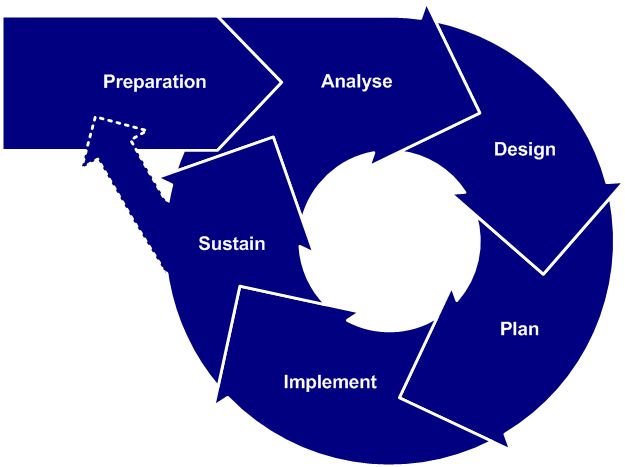
The Pacific Islands Forum showed major cracks in the approach to Fiji no matter how hard they were patched up for public presentation. Most Pacific leaders think Australia and New Zealand need to re-think their approach which one Australian observer (see below) said it had achieved none of its stated aims.
In the items below, one Pacific Islander writes of lack of "sensitivity," another of "coercion," another of "individual engagement" - with Fiji with or without Australia and New Zealand, and a former diplomat with Pacific knowledge writes that the Forum without Fiji is like "Hamlet without the Prince of Denmark."
The diagram of the change model when the first analysis failed sums it all up.
Only the deaf and the dead fail to hear messages like these:
WHERE ARE OUR PACIFIC EXPERTS? I received an email at the weekend from a Pacific Islander I've known since the 1960s and whose secondary schooling and first degree were in Auckland.
She wrote, I recently read one of your epistles in the local paper, re. the Natadola meet. I liked it as it is showed sensitivity without praising the current regime. I just wish that the governments of Australia and NZ had the same sense and sensitivity. Instead, they have disappointed me very much as I know there are people in both places who have a very good sense of what the Pacific Islands are like and the aspirations of the people who live there. Sadly their counsel is not often sought - to the detriment of all of us.
COERCION FAILED, NEW APPROACH NEEDED. Fragmentation within the Pacific’s regional and sub-regional bodies is worsening, Auckland University Pacific Studies expert Dr Sitiveni (Steven) Ratuva. Historically, says Ratuva, the region solved differences, such as the standoff with the Fiji military regime, through talanoa, or talking through an issue, but this has been supplanted by diplomatic coercion that is clearly not working.
He thinks the Pacific could learn something from ASEAN where member countries are not punished but engaged by other nations and encouraging change. Pacific "should begin to think in terms of having a proactive mechanism for this bullying rather than just punishment otherwise ... We are going for division and fragmentation rather than unity.”
Before taking up his appointment at Auckland University, Dr Ratuva taught at the University of the Pacific in Suva. He is a universally acknowledged authority on social and political issues in Fiji.
FORUM BENDS A LITTLE. It seems likely the Forum will invite Fiji to join future PACER Plus trade negotiations but the extent of the engagement is unclear. Individual Pacific countries are already engaging with Fiji, according to Tongan PM Dr Feleti Sevele, and a formal request was expected to be made to Fiji to re-engage with the the Joint Forum Group that ceased two years ago. A reader commented: "A Forum meeting without Suva being represented is a bit like Hamlet without the Prince of Denmark. I see that they are letting them back into the trade talks. Wise? Surely necessary!"
POLICY VACCUUM IN CANBERRA. This is the opinion of Dr Michael O'Keefe, senior lecturer in international relations at Melbourne's La Trobe University. He said that following Australia's initial response to the coup, several inflammatory escalations and signs of an emerging humanitarian crisis, Australia's policy towards Fiji had achieved none of its stated aims; democracy has not been restored, elections have been postponed and individual rights and freedoms curtailed.
The only diplomatic success has been cementing Australia's place as the dominant regional power, a Sheriff in our own right. What is needed is a fresh approach. We shouldn't reward a dictator, but Australia's "smart" sanctions have failed to punish Suva sufficiently to encourage compromise.
The maintenance of the sanctions status quo is now damaging Australia's strategic interests in the region and beyond. Sanctions are meant to target the regime and there is no sign that elites are suffering. Ordinary Fijians, however, are hurting regardless of ethnicity. Sanctions may be contributing to the very situation they were designed to avoid.
In truth, we can't disaggregate the factors. If sanctions are part of the problem, and a humanitarian crisis is developing, and if we claim that the South Pacific is our "patch", then we must do something to end the impasse. The stubborn maintenance of sanctions may no longer be in Australia's interests. But that is for the PM to decide.
INDONESIA AND THAILAND SUPPORT FIJI's REFORM AGENDA, would welcome more conciliatory moves from Aust and NZ, and would support Fiji's bid to become an ASEAN Observer.
These sentiments were expressed to Fiji’s Foreign Minister Ratu Inoke Kubuabola who is currently attending the Special Asian and Pacific Ministerial Meeting on the Millennium Development Goals (MDG) in Jakarta, Indonesia.-- Croz Walsh's Blog



